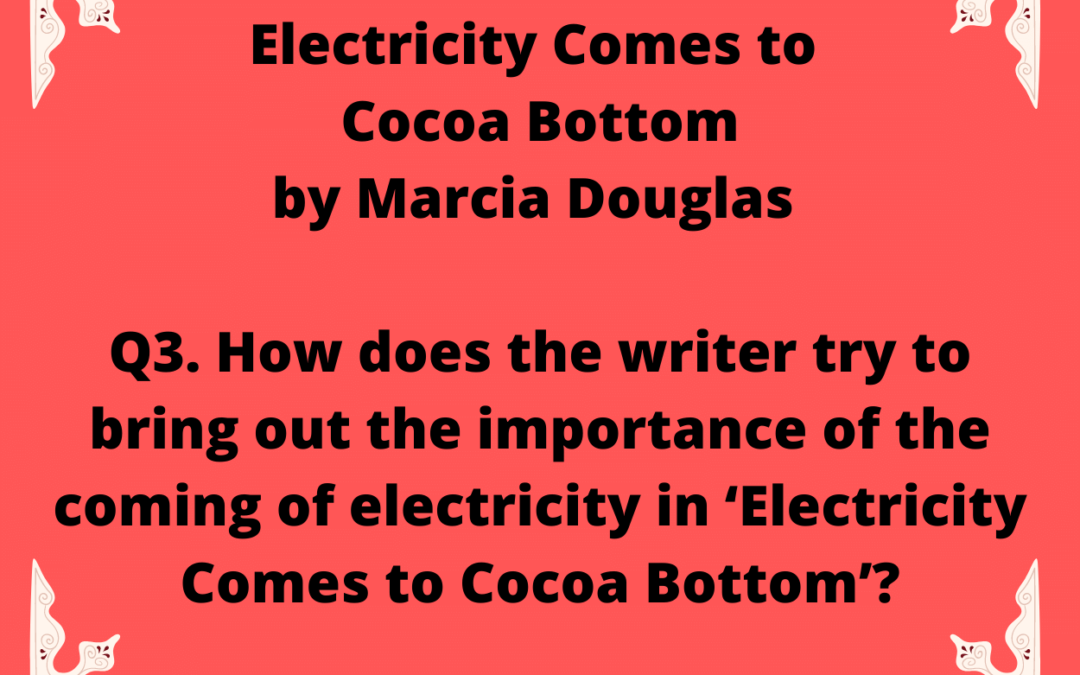Edexcel English IGCSE: Electricity Comes to Cocoa Bottom by Marcia Douglas
Q3. How does the writer try to bring out the importance of the coming of electricity in ‘Electricity Comes to Cocoa Bottom’?
In your answer, consider:
- how the people in the poem are presented;
- how nature reacts to the event;
- how the event itself is described;
- the use of language.
Refer closely to the poem in your answer. You may use brief quotations.
Edexcel English IGCSE Model Essay by an Expert
In ‘Electricity Comes to Cocoa Bottom’, the writer uses people, nature and the description of the event itself to portray the momentousness of the occasion to the reader.
The people in the poem are portrayed as excited and perhaps apprehensive about the coming of electricity, showing how significant this event is to the people of Cocoa Bottom. The fact that “all the children” went to watch the event shows that it is a big event for the village. The repetition of participles opening lines – “waiting” and “watching” – creates a sense of immediacy, highlighting their anticipation. One other character is described in the first stanza: Grannie Patterson. She “peeped” through her door. This word connotes apprehension, and perhaps even fear, suggesting that the older generation of the island is more frightened by the new technology on the island. Whether the people of the island are portrayed as excited or nervous, the significance of the event is clearly displayed through their behaviour in the first stanza.
Nature is personified to be expectant and excited about the arrival of electricity, like the humans. Fireflies “waited” and birds were “congregating”, like the children, to watch the lights come on. Even the breeze “held its breath” in expectation. This personification exaggerates the sense of anticipation that is felt regarding the coming of electricity. Nature also reacts strongly when the lights come on. The use of onomatopoeia in “tweet-a-whit” displays the vocal reaction of the birds, contributing to the sensory overload in the second stanza. Also playing on the reader’s senses, the writer uses repetition and participles to show nature’s movement in reaction to the electric lights: “fluttering”, “swaying, swaying” and “swelling and swelling”. This strong reaction, especially in contrast to the lack of information about the people’s reactions, suggests that nature is more ‘conscious’ of the importance of electricity than humans.
The writer’s description of the switch-on of the electric lights contains several literary techniques which highlight the importance of the event. In stark contrast with the slow pace and quiet finality of the first stanza, the second stanza opens with a sudden change in pace: the exclamation, “Light!” This surprises the reader, highlighting the drama of the arrival of electricity. Mr Samuel is also portrayed as a god-like figure, since he has a “yellow shimmer behind him” like a halo. The religious connotations suggest that the event is of miraculous importance.
The poem ends with concern that the event has not been recorded. Throughout the poem, the writer shows how important the arrival of electricity is to the island and its human and non-human inhabitants. However, the anti-climactic ending suggests that humans quickly move on from technological advancements, and start to take such miraculous things for granted.



